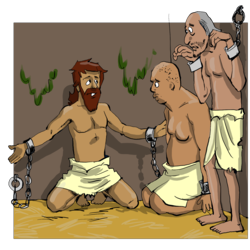David Livingstone was the most famous missionary of them all, but far from the most effective if effectiveness is measured by the number of people he introduced to Jesus. In 1838, he joined the London Missionary Society as a medical missionary. He arrived in Kurumun in South Africa in 1841 to assist in the work of Robert Moffat amongst the Bechuan people.
Livingstone, who married Moffat’s daughter Mary, soon discovered that he was more interested in exploration and then the abolition of the slave trade than in actual mission work. He spent much of the time between 1850 and 1856 exploring the Zambesi River, and in 1855 he was the first white man to see the Victoria Falls. He returned to England in 1856 and became a celebrity after publication of his Missionary Travels and Researches in South Africa. He resigned from the London Missionary Society to pursue further exploration opportunities.
Livingstone’s motto was Christianity, Commerce and Civilisation. He believed that the key to achieving these goals in Africa was to explore and open up the Zambezi River as a Christian commercial highway into the interior. Livingstone’s accomplishments as an explorer were significant, but Africa’s continuing history of poverty suggests that Livingstone’s hopes may have been misguided.





